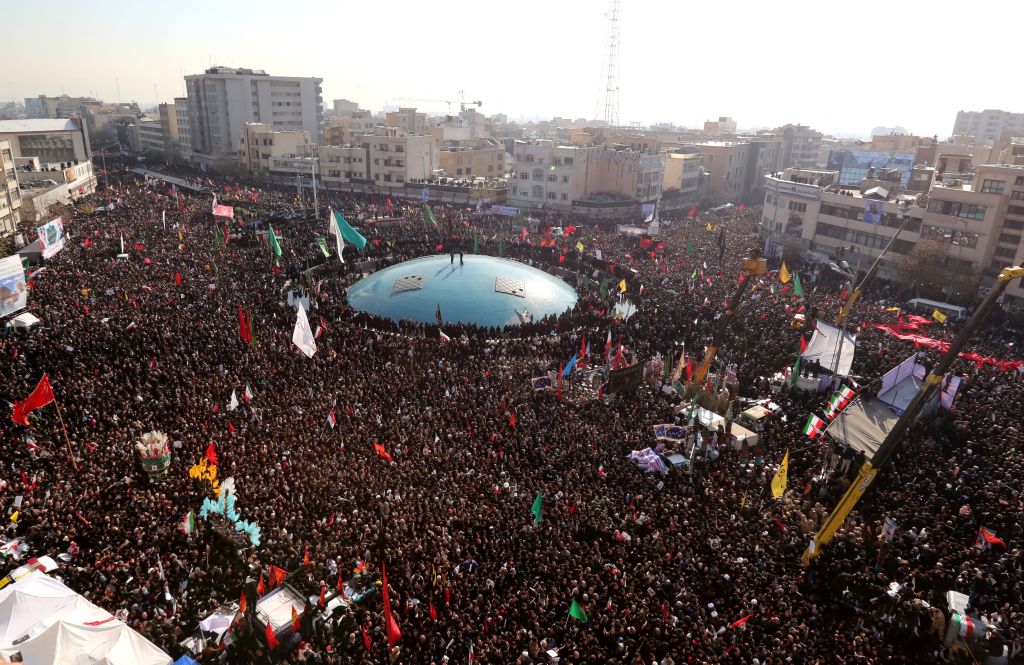The Soleimani killing is badly undermining Trump's purported Iran policy goals


A free daily email with the biggest news stories of the day – and the best features from TheWeek.com
You are now subscribed
Your newsletter sign-up was successful
President Trump's decision last week to order the killing of Iranian Gen. Qassem Soleimani, the Quds Force commander and second most powerful official in Iran, and his threats over the weekend to bomb Iranian cultural sites if Tehran retaliates, are hard to square with his stated and implied policy goals: To use punishing sanctions to force Iran to renegotiate a 2015 nuclear deal, or leverage that economic pain to foment revolt against Iran's anti-American leaders.
On the nuclear front, "Trump's gambit has effectively backfired," David Sanger and William Broad report at The New York Times. "Trump thought the nuclear deal was flawed because restrictions on Iran would end after 15 years," but "instead of buckling to American pressure, Iran declared on Sunday" that those limits are "over after less than five." And America's European allies, who tried mightily to salvage the pact, blame Trump's unilateral withdrawal for today's military brinksmanship and gave Secretary of State Mike Pompeo a "chilly reception" when he called for their support after Soleimani's killing, The Washington Post reports.
Tehran's theocratic leadership also "basked in a surge of nationalist sentiment and anger at home," writes Ishaan Tharoor at The Washington Post. "Less than two months ago, security forces are said to have killed hundreds of Iranian protesters to quell an uprising spurred by the regime’s dysfunctional management of the country’s crippled economy." Now, hundreds of thousands — or even millions — of Iranian are turning out to mourn Soleimani. Supreme Leader Ayatollah Ali Khamenei wept as he prayed over Soleimani's remains in front of a huge crowd. Soleimani's daughter and his successor both vowed vengeance on America.
The Week
Escape your echo chamber. Get the facts behind the news, plus analysis from multiple perspectives.

Sign up for The Week's Free Newsletters
From our morning news briefing to a weekly Good News Newsletter, get the best of The Week delivered directly to your inbox.
From our morning news briefing to a weekly Good News Newsletter, get the best of The Week delivered directly to your inbox.

"Even the hardliners, the religious hardliners here in this country, could not have thought that so many people would turn up today," CNN's Frederik Pleitgen reported from Tehran on Monday's New Day.
"At a time when his unprecedented sanctions had stirred unrest inside Iran," writes Mohammad Ali Shabani, a researcher at Soas University in London, "the strike on Soleimani, whose status approached that of national icon, will harden popular sentiment against the U.S. while simultaneously shoring up the regime."
A free daily email with the biggest news stories of the day – and the best features from TheWeek.com
Peter has worked as a news and culture writer and editor at The Week since the site's launch in 2008. He covers politics, world affairs, religion and cultural currents. His journalism career began as a copy editor at a financial newswire and has included editorial positions at The New York Times Magazine, Facts on File, and Oregon State University.
-
 Health insurance: Premiums soar as ACA subsidies end
Health insurance: Premiums soar as ACA subsidies endFeature 1.4 million people have dropped coverage
-
 Anthropic: AI triggers the ‘SaaSpocalypse’
Anthropic: AI triggers the ‘SaaSpocalypse’Feature A grim reaper for software services?
-
 NIH director Bhattacharya tapped as acting CDC head
NIH director Bhattacharya tapped as acting CDC headSpeed Read Jay Bhattacharya, a critic of the CDC’s Covid-19 response, will now lead the Centers for Disease Control and Prevention
-
 NIH director Bhattacharya tapped as acting CDC head
NIH director Bhattacharya tapped as acting CDC headSpeed Read Jay Bhattacharya, a critic of the CDC’s Covid-19 response, will now lead the Centers for Disease Control and Prevention
-
 Witkoff and Kushner tackle Ukraine, Iran in Geneva
Witkoff and Kushner tackle Ukraine, Iran in GenevaSpeed Read Steve Witkoff and Jared Kushner held negotiations aimed at securing a nuclear deal with Iran and an end to Russia’s war in Ukraine
-
 Pentagon spokesperson forced out as DHS’s resigns
Pentagon spokesperson forced out as DHS’s resignsSpeed Read Senior military adviser Col. David Butler was fired by Pete Hegseth and Homeland Security spokesperson Tricia McLaughlin is resigning
-
 Judge orders Washington slavery exhibit restored
Judge orders Washington slavery exhibit restoredSpeed Read The Trump administration took down displays about slavery at the President’s House Site in Philadelphia
-
 Hyatt chair joins growing list of Epstein files losers
Hyatt chair joins growing list of Epstein files losersSpeed Read Thomas Pritzker stepped down as executive chair of the Hyatt Hotels Corporation over his ties with Jeffrey Epstein and Ghislaine Maxwell
-
 Judge blocks Hegseth from punishing Kelly over video
Judge blocks Hegseth from punishing Kelly over videoSpeed Read Defense Secretary Pete Hegseth pushed for the senator to be demoted over a video in which he reminds military officials they should refuse illegal orders
-
 Trump’s EPA kills legal basis for federal climate policy
Trump’s EPA kills legal basis for federal climate policySpeed Read The government’s authority to regulate several planet-warming pollutants has been repealed
-
 House votes to end Trump’s Canada tariffs
House votes to end Trump’s Canada tariffsSpeed Read Six Republicans joined with Democrats to repeal the president’s tariffs
